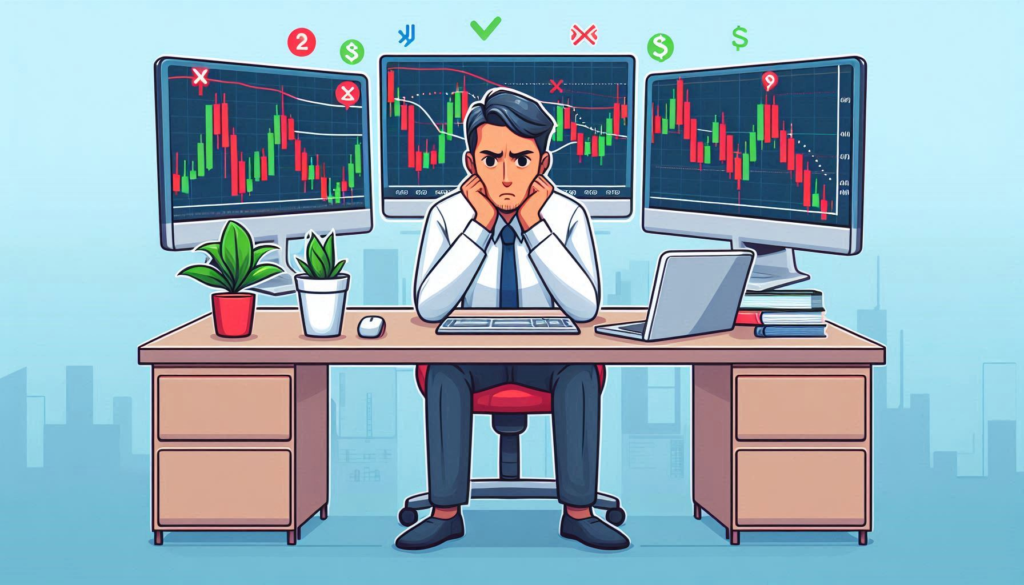In the fast-paced world of forex trading, experiencing losses is an inevitable part of the journey. However, it’s not the losses themselves that define a trader’s success, but rather how they recover and grow from these setbacks. This comprehensive guide will explore effective strategies to help you bounce back from forex losses, rebuild your trading confidence, and develop a more robust approach to navigating the volatile forex market.
Understanding Market Volatility and Its Impact on Forex Trading
Market volatility is a double-edged sword in the forex world. While it can create lucrative opportunities for savvy traders, it also amplifies the risk of significant losses. To recover from forex losses effectively, it’s crucial to understand the nature of market volatility and its implications for your trading strategy.
Key aspects of market volatility in forex:
– Rapid price fluctuations
– Increased trading volume
– Wider bid-ask spreads
– Higher potential for both profits and losses
“The market can remain irrational longer than you can remain solvent.” – John Maynard Keynes
This famous quote underscores the importance of having a well-rounded recovery plan when dealing with forex losses. By acknowledging the unpredictable nature of the market, traders can better prepare themselves for potential setbacks and develop strategies to mitigate their impact.
Steps to Recover from Forex Trading Losses
1. Learn from Your Mistakes
The first step in recovering from forex losses is to conduct a thorough post-trade analysis. This process involves examining your trading decisions, identifying what went wrong, and determining how you can improve your approach in the future.
Key elements of effective post-trade analysis:
– Review your trading journal
– Analyze market conditions at the time of the trade
– Evaluate your emotional state during decision-making
– Identify patterns in your losing trades
By engaging in this self-reflection, you can adapt your trading methods and develop a more resilient strategy for future market engagements.

2. Keep a Detailed Trade Log
Maintaining a comprehensive trading journal is essential for long-term success in forex trading. This practice not only helps you track your progress but also provides valuable insights into your trading patterns and decision-making processes.
Components of an effective trading journal:
- Entry and exit points
- Position size and leverage used
- Reasons for entering the trade
- Market conditions and relevant news events
- Emotional state before, during, and after the trade
- Profit/loss and lessons learned
By regularly reviewing your trading journal, you can identify recurring patterns in your losing trades and make informed adjustments to your strategy.
3. Implement a Gradual Rebuild Strategy
After experiencing significant forex losses, it’s crucial to resist the urge to immediately jump back in with large positions. Instead, focus on rebuilding your trading portfolio gradually.
Steps for a gradual rebuild:
- Start with smaller position sizes
- Focus on high-probability trades
- Implement stricter risk management rules
- Gradually increase position sizes as confidence grows
This approach allows you to regain your footing in the market while minimizing the risk of further significant losses.
4. Master the Art of Scaling
Scaling in and out of positions is a powerful technique that can help manage risk and optimize returns, especially when you want to recover from forex losses.
Benefits of scaling:
– Reduces the impact of market volatility
– Allows for more flexible position management
– Helps mitigate emotional trading decisions
To implement scaling effectively, consider using a combination of technical analysis and strict valuation criteria to determine optimal entry and exit points.
5. Utilize Limit and Stop Orders
Emotion-free trading help you to recover from forex losses. Limit and stop orders can help you stick to your trading plan and avoid impulsive decisions.
Types of orders to consider:
– Stop-loss orders: Limit potential losses
– Take-profit orders: Lock in gains
– Trailing stops: Protect profits while allowing for potential upside
By incorporating these orders into your trading strategy, you can better manage risk and protect your capital during the recovery process.
Our Professional Traders Can help you manage your forex Account
Long-Term Strategies for Sustained Forex Recovery
In order to recover from Forex Losses , you should not only focus on short-term fixes alone; it’s about developing a sustainable approach to trading that can withstand market fluctuations and minimize the impact of future setbacks.

Developing a Comprehensive Risk Management Plan
A robust risk management plan is the cornerstone of successful forex trading. When recovering from losses, it’s essential to reassess and strengthen your risk management approach.
Key components of a forex risk management plan:
- Position sizing rules
- Maximum drawdown limits
- Correlation analysis of currency pairs
- Diversification strategies
- Regular review and adjustment of risk parameters
By implementing a comprehensive risk management plan, you can better protect your trading capital and increase your chances of long-term success in the forex market.
Improving Trading Discipline and Emotional Control
Emotional trading is often a significant contributor to forex losses. Developing stronger trading discipline and emotional control is crucial for sustained recovery and future success.
Techniques for improving trading discipline:
– Meditation and mindfulness practices
– Keeping a trading journal to track emotions
– Setting clear trading rules and sticking to them
– Taking regular breaks to maintain perspective
Remember, successful trading is as much about mindset as it is about strategy. By cultivating emotional resilience, you can make more rational decisions and avoid costly mistakes.
Continuous Education and Adaptation
The forex market is constantly evolving, and staying informed is crucial for long-term success. Commit to ongoing education and be willing to adapt your strategies as market conditions change.
Resources for continuous forex education:
– Online courses and webinars
– Financial news and analysis websites
– Trading books and publications
– Forex trading forums and communities
By staying up-to-date with market trends and expanding your knowledge base, you can develop more effective trading strategies and better navigate the challenges of forex trading.

Case Study: Recovering from a Major Forex Loss
Let’s examine the journey of Sarah, a forex trader who experienced a significant loss and successfully Recover from Forex Losses using the strategies outlined in this article.
Background:
– Sarah had been trading forex for two years
– She experienced a 40% drawdown due to overleverage and poor risk management
– The loss severely impacted her trading confidence
Recovery Steps:
- Conducted thorough post-trade analysis
- Implemented a detailed trading journal
- Consulted with a tax professional to optimize her tax strategy
- Reduced position sizes and focused on high-probability trades
- Developed a comprehensive risk management plan
- Invested in forex education and mentorship
Results:
– Recovered initial losses within 8 months
– Developed a more consistent and profitable trading approach
– Significantly improved emotional control and trading discipline
Sarah’s experience demonstrates that with the right approach and mindset, it’s possible to not only recover from forex losses but also emerge as a stronger, more disciplined trader.
Conclusion
Recovering from forex losses is a challenging but essential part of a trader’s journey. By implementing the strategies outlined in this article, you can turn setbacks into opportunities for growth and improvement. Remember to:
– Learn from your mistakes through thorough post-trade analysis
– Maintain a detailed trading journal
– Implement tax-smart strategies
– Rebuild gradually and scale your positions wisely
– Utilize limit and stop orders for emotion-free trading
– Develop a comprehensive risk management plan
– Focus on continuous education and emotional control
With patience, discipline, and a commitment to improvement, you can successfully recover from forex losses and build a more resilient and profitable trading career. Stay focused on your long-term goals, and remember that every setback is an opportunity to become a better trade .You can always recover from Forex Losses no matter what

